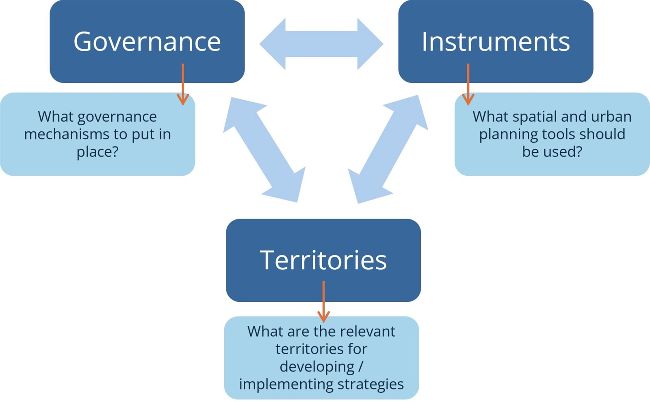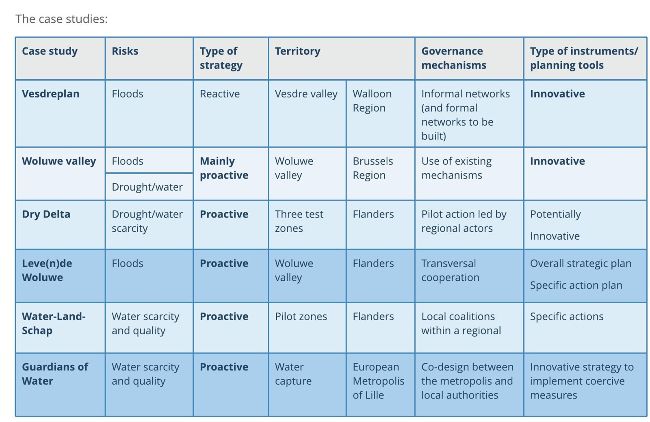Urbanisation strategies for transregional or transnational valleys facing climate change
Thomas Deridder, Director-General, Christian Bastin, Associate Researcher, Destrée Institute
Year after year, water management retains an increasingly important place in Belgian spatial planning policy. Extreme weather events such as the catastrophic floods of 2021 in Wallonia and the growing risk of drought and water shortage led stakeholders to become interested in this subject.
In this context, the three Belgian regions decided to launch a pilot action, as part of the Territorial Agenda 2030, that would examine two types of strategies for water management: a proactive strategy aimed at anticipating and preventing disasters, on the one hand, and a reactive strategy focused on crisis management mechanisms, on the other.
During intra-Belgian preparatory discussions on two case studies (the Vesdre valley in the Walloon Region, and the Woluwe valley in Flanders and the Brussels Region), three fundamental dimensions and associated questions were identified. They can be summarised as in Figure 1.

Dimensions of and questions on the case studies
In order to fuel reflection on these three dimensions, the Belgian regions organised two webinars open to European partners, on 11 September and 12 October 2023. The first webinar focused on an exchange of experiences in which speakers presented six case studies from Wallonia (the multidisciplinary strategic plan for the Vesdre watershed, referred to as "the Vesdre plan"), Flanders ("The Dry Delta", "Leve(n)de Woluwe" and "Water-Land-Schap"), Brussels Region (the Woluwe valley) and the European metropolis of Lille, in France ("Gardiennes de l'eau", referred to as "Guardians of Water"); see Table 1.
The second webinar favoured open discussions based on a series of guiding questions during two round tables. These two events brought out the initial key elements explained below.
Governance
In terms of governance, a few key elements emerged. The first one is the importance of networks and the cooperation of actors at all levels and between sectors. This element is particularly important for the many small innovative water management projects, which are increasingly multifunctional, as described in the Woluwe valley and Dry Delta case studies.
Networks and the cooperation of actors is particularly important for the many small innovative water management projects, which are increasingly multifunctional
At transregional and transnational levels, a lack of knowledge of the relevant structures and stakeholders on the other side of the border constitutes a major obstacle, which could possibly be overcome through a mapping of stakeholders.
Regarding horizontal cooperation, there is a need for greater territorial solidarity, which must be based on win-win solutions given that the solutions are often to be found in other territories than those where the consequences are felt. This is notably the case in the Vesdre valley, where decisions taken in villages located on the plateau have an impact on villages in the valley.

Finally, the role of the umbrella authorities (often the regional authority) is an important one in terms of financing local projects, providing technical and logistical support and guaranteeing that local projects are consistent with each other. This role seems particularly important in times of crisis, as described in the Vesdre valley case study. However, for prevention policies, local authorities seem better equipped to implement transversal projects because of their knowledge of their territory and their population. This is particularly the case when establishing local coalitions, as in the Water-Land-Schap project.
Instruments
In terms of instruments, there is strong interest in using innovative and non-binding spatial planning instruments, as illustrated by the Guardians of Water and the Leve(n)de Woluwe case studies. These instruments add real value because they offer numerous possibilities. They notably make it possible to better adapt the content, procedures and territorial scale to the problems to be solved. It is also possible to test their efficiency, which could ultimately lead to positive changes in traditional instruments.
However, it is important to set up consultation and co-creation mechanisms to ensure that these non-binding instruments are properly implemented. These mechanisms should involve a large number of stakeholders, including local authorities and citizens, who are now considered important in territorial planning. They should start when the diagnosis is established, continue throughout the whole construction process and end with the choice of measures to be implemented. This participatory process was notably experienced in the Vesdre valley during the preparation of the Vesdre plan.
The role of the umbrella authorities is important in terms of financing local projects, providing technical and logistical support and guaranteeing that local projects are consistent with each other.
Territories
The choice of watersheds and their delimitation as relevant territories for water management does not seem to be an issue. However, there is an interest in testing strategies in pilot areas, generally chosen according to their territorial typology.
In addition, the establishment of a global vision of territorial development is necessary to ensure the coherence of the various strategies and local projects. However, this approach proves difficult to implement, as shown in the Guardians of Water project.
Next steps
These first key elements, complemented by additional reflections from bilateral interviews, will be developed in more detail in a guide to good practices. This guide will be published during the Belgian Presidency of the Council of the European union, the first half of 2024.
Thomas Deridder, Director-General, Destrée Institute, and Christian Bastin, Associate Researcher, Destrée Institute